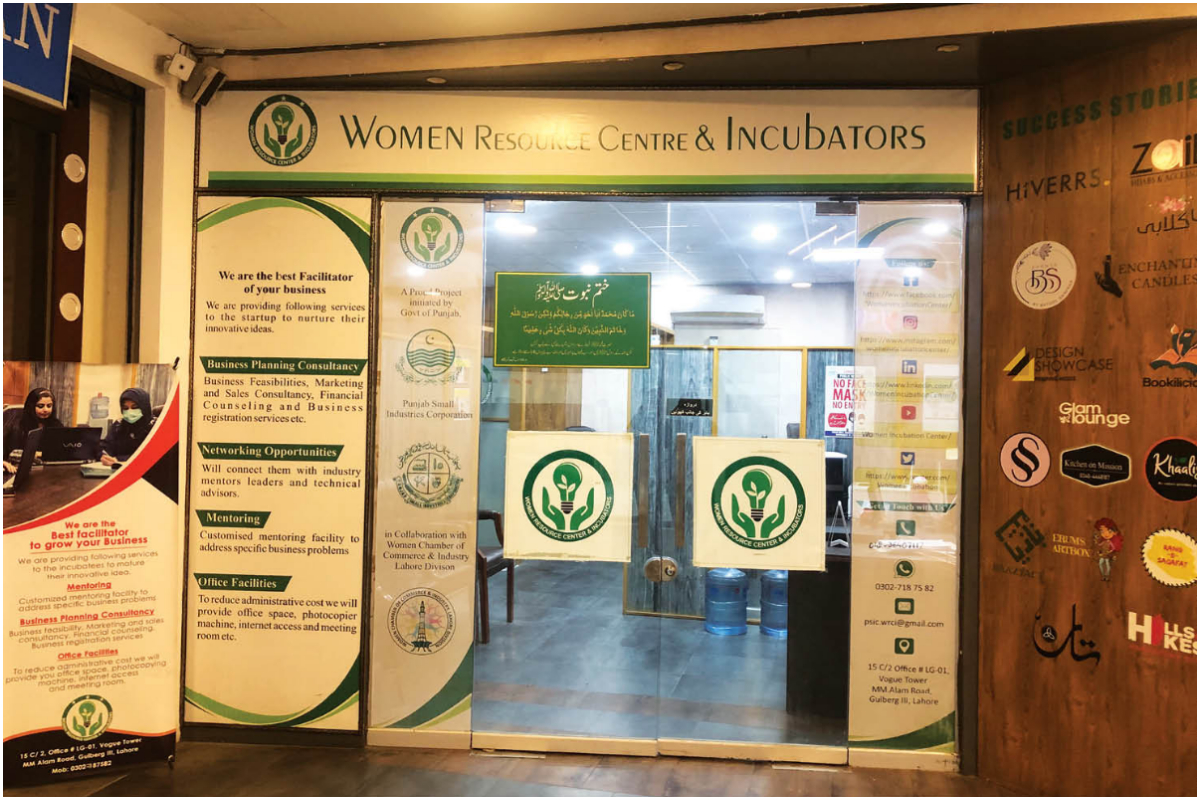
Punjab govt enabling women startups with training programmes
LAHORE: MM Alam Road, the upscale locality of Lahore city, is an unusual place for government offices. The road houses corporate ventures, co-sharing offices, fashion brands’ displays, hangouts, eateries, and so on.
In the basement of a building, there sits an office – a government office – where everyday women from different backgrounds sit and learn skills and techniques to realise their dreams. The buzzword among their discussions and presentations is the “startup”. This is the premises of the Women Resouce Centre and Incubation, an initiative of the Punjab Small Industries, to empower those women, who have dreams, and need the government’s support to push their dreams into realities.
Bushra Khan is running Kitchen on Mission, an online food provider. She gives credit to the resource centre to help her out in running this project.
“During the Covid-19 lockdown days last year, I was planning to sack my domestic help due to financial constraints,” she says. “I didn’t want to fire them for I knew that there are no jobs in the market.”
In those days, Bushra, having an MCom and an MBA degree, enrolled in the incubation. By the time of her graduation, which happened in four months, she had skills, networking, financial support and motivation to start the unique start-up, which intended to give jobs to jobless drivers to work as food delivery people. With digital marketing, she made up a good clientele and now her business supplies 26 dishes a day to different corporate offices every day.
Contrary to popular incubation trends that enrol and mentor only tech-savvy individuals and groups, this incubation is open to all women regardless of their digital literacy and skills.
“The only thing we value and require for our trainees is to have a unique, workable business idea,” says Dr Shehla Javed Akram, the founder and chairperson of the Lahore Women Chamber of Commerce and Industries. She led a campaign for convincing the government to open the women-only incubation in Lahore.
“We’ve been lucky enough to have highly motivated trainees in initial batches, which set the real culture of the resource centre.”
The centre started working in 2021, and since then it has graduated four batches. Sohaib Zafar oversees the operation of the centre.
He says that to pass out, a trainee must go through four phases over 16 weeks.
The centre conducts outreach initiatives, calls for startups, business plan competitions, and open or merit-based selection procedures through a selection committee during the initial phase of pre-incubation.
The committee chooses 20 students for the course.
Trainees go through programme orientation, vision and validation, client development, revenue and loaning opportunities while branding and design come in the second phase. Several events and workshops are also held during this time for trainees. The phase also includes an assessment of the ideas, validation of scalability and pivoting.
In phase three, trainees participate in activities such as legal education, product creation, and market trips. The last stage includes investor meetups, leaving the incubator with a comprehensive business plan, and a graduation ceremony.

Is seed investment available through incubation?
“No,” Sohaib Zafar says.
“Unlike other incubators, we do not provide funding to start-ups. However, we inform our trainees about financing opportunities in both the public and commercial sectors.”
He gives several examples of how they assisted their trainees in obtaining soft loans from SMEDA and the Punjab Small Industry Corporation to enable them to manage their enterprises. Other than funding, the centre also helps its graduates to get berths in state-run exhibitions and events to showcase their products. The centre has an active partnership with the
Punjab Industry Department, Women Chambers of Commerce and Industry, and regional public and private higher educational institutions.
Sohaib Zafar says the establishment of the incubation centre has aided female entrepreneurs in constructing their enterprises, bolstering their companies’ R&D portfolios, connecting with others in the industry, and taking direction in product development, brand management, trade regulations, and so on. He claims that trainees are taught in designing business items, forming business models, marketing their products, building their brands and grooming themselves and their companies.
Dr Shehla Javed Akram closely follows the centre’s work as she has been involved with it since its inception. She describes the endeavour as her “baby,” intending to inspire women to explore their entrepreneurial ideas.

According to her, incubator programmes at public institutions prompted her to start this women-only facility. To ensure its success, she assisted the centre in locating the greatest instructors, developing an effective curriculum, and selecting eligible candidates for each batch.
Asif Ali Farrukh, the managing director of the Punjab Small Industries Corporation, says the success rate of the startups of their graduates is more than 30 per cent, whereas the world over, the rate is four per cent.
He credits the success of the centre with its fine policies and the dedication of graduates.
“The department started the programme as a pilot, and now we will try to find a way out to keep it rolling.”
Bushra Khan keeps on visiting the centre and shares her challenges, rewards, and market experiences with the trainees. She is hopeful that the graduating batch will also keep in touch with their junior batches in the coming days.
That is the best way to give back to their community.
Catch all the Urban Insight News, Breaking News Event and Latest News Updates on The BOL News
Download The BOL News App to get the Daily News Update & Live News.












 Read the complete story text.
Read the complete story text. Listen to audio of the story.
Listen to audio of the story.